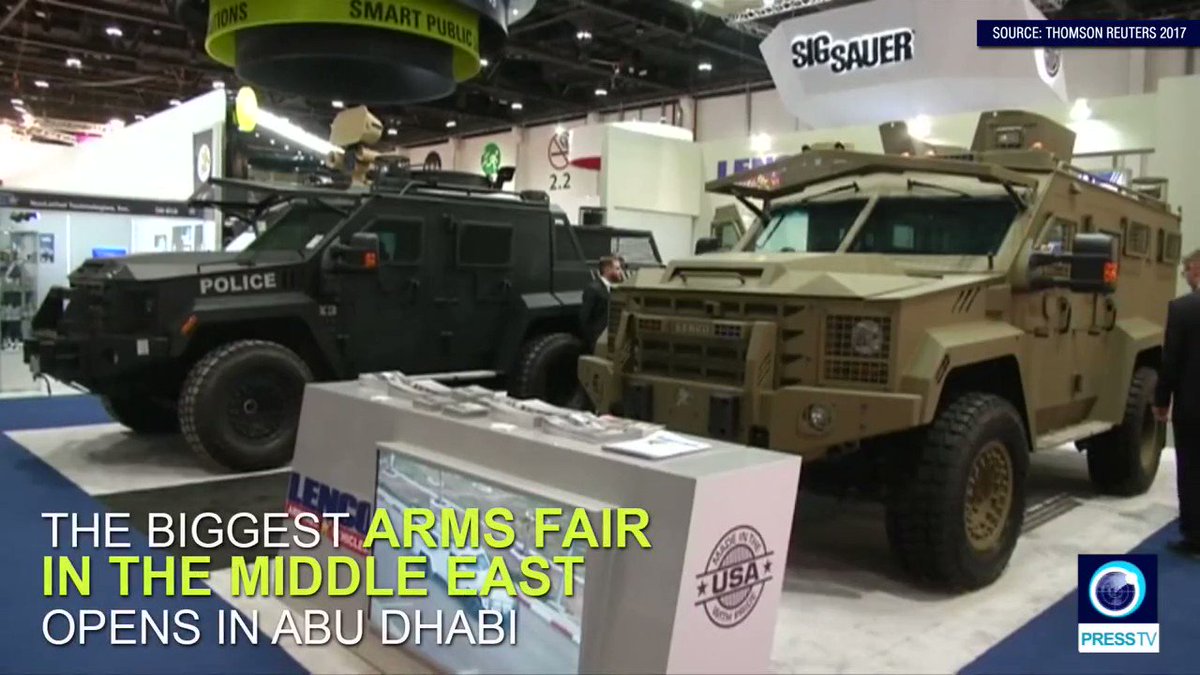Worldwide arms trade has risen to highest level since Cold War in last five years, driven by demand from Middle East, Asia, study says
The four-day International Defence Exhibition and Conference (IDEX) kicked off on Sunday in Abu Dhabi with the United Arab Emirates announcing 21 deals worth more than $1.2bn.
IDEX spokesman Brigadier-General Rashid Mohammed al-Shamsi told reporters the Emirates struck deals with 15 local companies and six international firms to bolster its land and naval forces.
The lion’s share came from the $544m purchase of 400 armoured personnel carriers from a local manufacturer, the Associated Press reported. Raytheon, a US company based in Waltham, Massachusetts, announced a deal with the UAE navy for missiles to arm its Baynunah-class corvettes.
WATCH: #Idex 2017, the biggest arms fair in the Middle East opens in Abu Dhabi
Many of the other contracts dealt with resupplying ammunition for the UAE, which is taking part in the Saudi-led campaign against Houthi rebels and their allies in Yemen, AP said. The war, which has killed more than 10,000 civilians, began in September 2014 and the Gulf Arab nations entered the conflict in March 2015. It shows no signs of ending soon.
Two of the UAE’s most-powerful rulers, Abu Dhabi Crown Prince Mohammed bin Zayed al-Nahyan and Dubai’s ruler, Sheikh Mohammed bin Rashid al-Maktoum, attended the event.
UAE is also seen as an important regional ally in the US-led coalition’s fight against the Islamic State (IS) group in Iraq and Syria.
International contracts announced on Sunday included one with French firm Thales Underwater Systems SAS to buy sonars for the navy worth more than $23m, and another with Britain’s HESCO Group for defensive fortifications worth more than $24m.
A statement also listed deals with Emirati companies, including one with International Golden Group for ammunition worth around $107m.
The UAE also signed contracts with local firms to supply and install electronic communications systems for the navy, armour mechanisms and monitoring equipment.
IDEX, which runs to Thursday, is one of the largest arms fairs in the Middle East and is held biannually to showcase the latest in defence technologies and innovations.
Middle East boosts world arms sales
Meanwhile, a study said on Monday that the worldwide arms trade has risen to its highest level since the Cold War in the last five years, driven by demand from the Middle East and Asia.
“Transfer of major weapons in 2012-16 reached their highest volume for any five-year period since the end of” the Cold War, the independent Stockholm International Peace Research Institute (SIPRI) said in a statement.
The share of countries in the Middle East and the Gulf monarchies jumped from 17 percent to 29 percent, far ahead of Europe (11 percent, down seven points), the Americas (8.6 percent, down 2.4 percentage points) and Africa (8.1 percent, down 1.3 points).
“Over the past five years, most states in the Middle East have turned primarily to the USA and Europe in their accelerated pursuit of advanced military capabilities,” said Pieter Wezeman, senior researcher with the SIPRI Arms and Military Expenditure Programme.
“Despite low oil prices, countries in the region continued to order more weapons in 2016, perceiving them as crucial tools for dealing with conflicts and regional tensions,” he added.
Saudi Arabia was the second-biggest importer of weapons in the world (up 212 percent), behind India, which unlike China, does not have production at national level yet.
The US remains the top weapons exporter with a 33 percent market share (up 3 points), ahead of Russia (23 percent, down 1 point), China (6.2 percent, up 2.4 points) and France (6.0 percent, down 0.9 points) passing Germany (5.6 percent, down 3.8 points).
These five countries account for almost 75 percent of global exports of heavy weapons.




